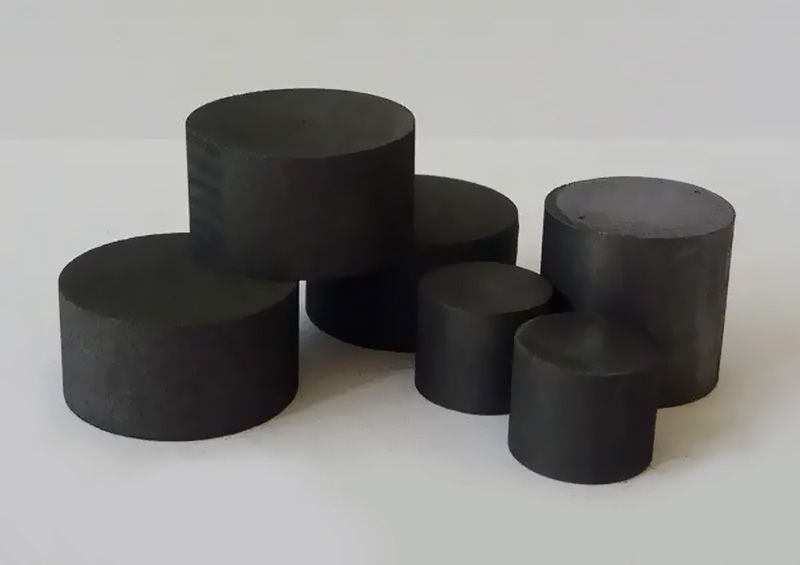
 2022-11-19
2022-11-19
 2023-08-07
2023-08-07The graphite mold materials used for diamond tool manufacturing are mainly graphite materials with ultra-fine particle structure, high purity, and high degree of graphitization. The average diameter of graphite mold materials is less than 15 microns, even less than 10 microns, and the average pore size is less than 2 microns. The graphite mold made from this carbon raw material has advantages such as low porosity, dense structure, high surface finish, and strong oxidation resistance, with an average service life of 30-40 times.Electronic sintered graphite molds and transistor supports can be manufactured using artificial graphite materials with minimal thermal deformation. At present, they are widely used and have become indispensable materials for the development of the semiconductor industry.The electronic sintered graphite mold of hot pressed sintered diamond tools has dual functions of heating element and mold support in the manufacturing process of diamond tools. The quality of t
 2023-08-03
2023-08-03The flotation method is one of the conventional mineral purification methods that consumes less energy and reagents, and has lower costs. This is a major advantage of the flotation method for purifying graphite. However, when using the flotation method to purify graphite, it can only achieve a limited improvement in the grade of graphite. For flake graphite, using multi-stage grinding not only cannot completely dissociate its monomers, but also is not conducive to protecting the large flakes of graphite. Therefore, using flotation to further improve the graphite grade is not economical or scientific. To obtain high carbon graphite with a carbon content of over 99%, it is necessary to use chemical methods to purify the graphite.(1) Chlorination roasting methodThe low roasting temperature and low chlorine consumption of the chlorination roasting method greatly reduce the production cost of graphite. At the same time, the carbon content of graphite products is equivalent to that after tr
 2023-08-03
2023-08-03Flake graphite is obtained by mining and processing from graphite mines. The types of ore mined are different, and when processing flake graphite, it is also necessary to process it correctly based on the characteristics of the graphite ore. So how should we proceed with the operation? Let's have a simple understanding of flake graphite below.1. Mineral processing method for flake graphite cryptocrystalline graphite.Cryptocrystalline graphite crystals are very small, hence also known as microcrystalline graphite. Graphite particles are usually embedded in clay and difficult to separate. Due to the high grade of the raw ore (usually containing carbon), many graphite mines directly crush and process the extracted ore, selling graphite powder products.2. Mineral processing method for crystalline graphite in flake graphite.The natural floatability of crystalline graphite is good, and it is basically used in China. Due to the particle size of graphite sheets being one of its most important
 2023-08-03
2023-08-03The quality of flake graphite determines the product quality of processed flake graphite powder. The flake graphite resource is crystalline natural graphite, which is formed by the metamorphism of carbonaceous rocks under long-term geological processes. The crystallization of flake graphite is in the form of flakes. The size of the flake crystal and the fixed carbon content of flake graphite are key factors that affect the quality of flake graphite. Below, we will take you to understand:As a basic processing material for various graphite powder products, the quality of flake graphite is a very important condition. Based on the quality and various parameters of flake graphite, it can be processed into flake graphite powder, ultrafine graphite powder, high-purity graphite, nano graphite, colloidal graphite and other graphite powder products. The size of flake graphite determines the lubrication performance of the processed graphite powder. The larger the size of flake graphite, the bett
 2023-08-02
2023-08-02Flake graphite is a type of natural graphite that, after being extracted and purified, generally appears in the form of fish scales, hence it is called flake graphite. Expandable graphite refers to flake graphite that, after acid washing and intercalation treatment, expands by about 300 times compared to the previous graphite. It can be used as raw materials for coils and flexible graphite. Below, let me introduce in detail the differences between flake graphite and expandable graphite:1. The use of flake graphite is more extensive than that of expandable graphiteIn industrial production, flake graphite not only has the function of expandable graphite, but also has much better conductivity, thermal conductivity, smoothness, and so on than expandable graphite. So its practical use in industry is becoming increasingly widespread.2. The production processes of flake graphite and expandable graphite are differentFlake graphite is mainly made by mechanical damage and grinding. Expandable g
 2023-08-02
2023-08-021. Sealing material: the raw material high carbon graphite is mixed with concentrated sulfuric acid and nitric acid for acidification treatment, heat treatment and then pressed into shape. The prepared flexible graphite is a new high-performance sealing material and a nano material grown in situ. Compared with traditional sealing materials such as asbestos rubber, it has good Compressibility, resilience, self-adhesion, low density and other excellent properties, and can be used at high temperature It has been used for a long time under harsh working conditions such as high corrosion. Graphite plates and sealing elements made of it are widely used in aerospace, machinery, electronics, nuclear energy, petrochemical, electric power, shipbuilding, smelting and other industries. Because of its excellent characteristics such as light weight, conductivity, heat conduction, high temperature resistance, acid and alkali corrosion resistance, good resilience, lubrication, plasticity and chemical